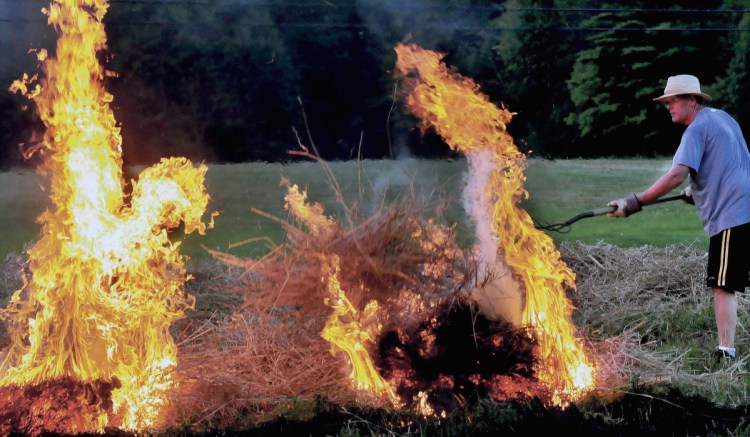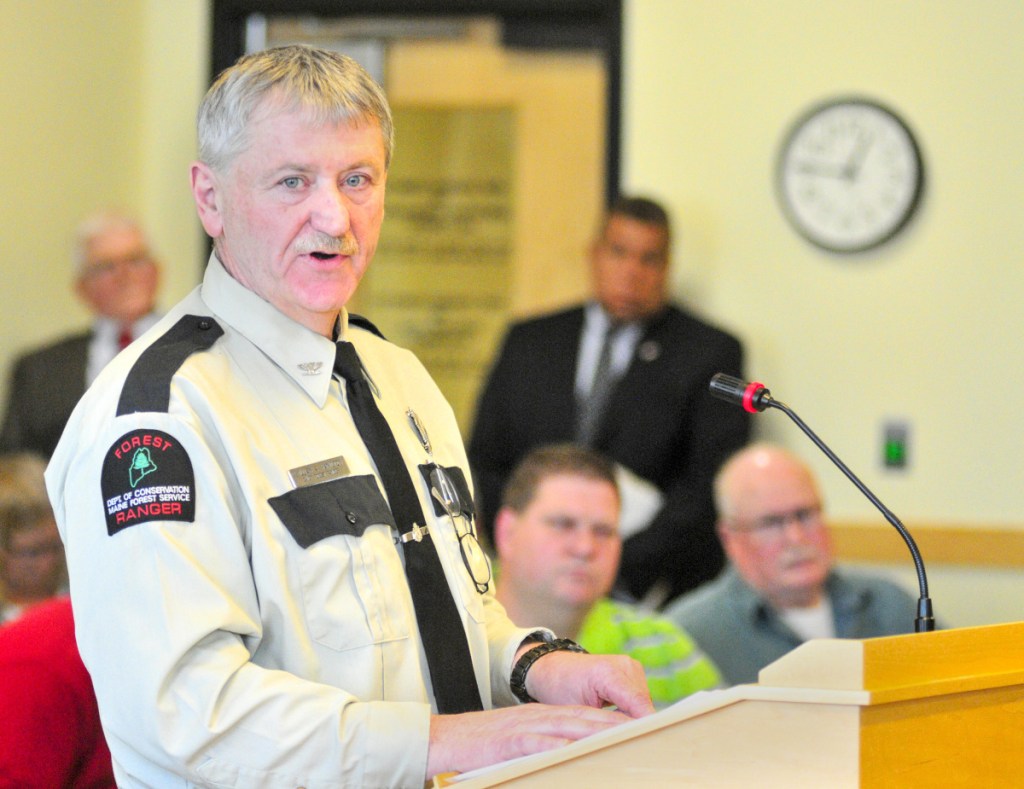AUGUSTA — Free online burn permits will continue to be available through private vendors now that state lawmakers have overwhelmingly overridden a veto by Gov. Paul LePage of a bill designed to preserve that resource for Maine residents.
The legislation L.D. 1809, requires the director of the Bureau of Forestry to allow communities to continue to use private services to issue burn permits if the software meets requirements spelled out in state law.
This marks the latest step in an ongoing dispute over who has authority to issue burn permits and how they may be issued.
A little more than a year ago, the Forest Service notified communities using Warden’s Report and Burning Permit that their residents might be guilty of a crime if they relied on permits issued online by either of those services rather than using the state’s own service, Maine Open Burn Permit.
The Forest Service’s concern has been public safety. In Maine, open burns are allowed only after 5 p.m. While some communities choose to override the restrictions on allowable burn times, the responsibility remains with the resident seeking the permit to verify what the conditions are for burning.
That prompted emergency legislation that passed into law without the governor’s signature that explicitly allowed such services to be used.
But after the Forest Service issued a lengthy directive later in the summer discouraging the use of the private web-based services, the Legislature took up the matter again.
This bill also gives the director of the Bureau of Forestry 10 days to approve the software being used; if the director fails to approve or deny the use of the software, the municipality may use it. And it authorizes the director to adopt major substantive rules relating to burn permit software.
Gary Hickey II, who is now chief of the West Gardiner Fire Department, initially developed Warden’s Report with another West Gardiner firefighter in 2013, as a way to save money for towns and their residents. At the time, West Gardiner was paying its fire wardens to perform the service, and this was a way to cut that cost.
Warden’s Report allows residents of communities that have signed up for the service — currently about 85 — to use a website to get a permit, if burning is allowed on that day.
At the time, he had informed both the Forest Service and the Attorney General’s Office.
While Hickey initially charged a nominal fee to communities that joined to cover the costs of running the site, Warden’s Report is now offered for free; the cost is paid by sponsors.
Matthew Scott, a member of the Gorham Fire Department for more than 25 years, developed BurningPermit.com with a software developer more than a decade ago, originally under a contract with the state. His service provides fire chiefs with a web-based platform to issue online permits and manage data.
Both systems allow real-time data on permits to be collected. There appears to be no review of the information collected on paper permits.
Scott said Monday he’s not planning on doing anything differently, and he will make his service available to anyone who wants to use it.
Both Hickey and Scott have said they tried repeatedly to set up meetings with the Forest Service in 2017 when the initial bill was passed, but their requests went unanswered.
In fact, the legislative hearing on L.D. 1809 was the first time in months that members of the Maine Forest Service and Hickey and Scott were in the same room.
Fire chiefs from around the state testified in favor of the third-party systems at that hearing, saying they make obtaining burn permits easier and have cut down on the instances of illegal burns. They also save department time and money because it’s easy to track whether a permit has been issued when they receive a report of a smoke sighting, and that cuts down on the number of their emergency responses, they said.
But others, like Patrick Strauch, director of the Maine Forest Products Council, said a centralized system is better from both a policy and safety perspective.
In Maine, anyone burning brush, wood debris, grass or agricultural fields requires a permit issued either by the Maine Forest Service or their own city or town.
The Forest Service imposes a number of regulations on how and when open burns may take place; the state limits them to after 5 p.m., but local fire chiefs have discretion to allow them at other times.
Under state law, the director of the Maine Forest Service may delegate his or her authority to town forest fire wardens and their deputies for paper permits only, which the Forest Service supplies. State residents may obtain paper permit at no cost or they may obtain one from a Maine forest ranger.
Last year, the Forest Service said those systems had been allowed to be developed in error.
One of the differences between the state’s system and the private systems is that the state charges a $7 fee for a two-day permit, a portion of which goes back to the community where it was issued, while permits issued though the private systems are free.
At the legislative hearing, Chief Forest Ranger Bill Hamilton urged lawmakers to lift the charge as argued against the bill.
In his veto message, LePage noted that a last-minute amendment reinstated the $7 fee for the state-issued permits, while no fee was imposed on permits issued by the state’s two private providers.
“This creates a dual-tiered system where people and businesses in only a few towns, mostly in southern Maine, will have online access for free permits. This change negatively discriminates against residents and businesses operating in Maine’s unorganized territories and rural towns, which lack the capacity or resources to contract with an online service,” he wrote.
Following LePage’s July 3 veto, the Senate voted 34-0 and the House voted 139-5 to override.
With the veto override, John Bott, director of Communications for the Department of Agriculture, Conservation and Forestry, said those living in rural towns and unorganized territories will continue to pay $7 for a state-issued online permit.
Sen. Shenna Bellows, D-Manchester, said Monday that Hickey developed Warden’s Report because he questioned the inefficiencies and safety of the state system and designed a better way to issue and track the permits.
“We should be encouraging more private sector partnerships like this to make government work better for people. I’m glad we can put this issue behind us, and communities can use these systems now.”
Hickey said he briefly shut down the service after the first round of letters when out from the Forest Service in 2016. Once the initial legislation was passed, he put the website back into service.
This law is expected to go into effect immediately after the Legislature adjourns; no date has been set yet for the end of the current special session.
Jessica Lowell — 621-5632
Twitter: @JLowellKJ
Send questions/comments to the editors.




Success. Please wait for the page to reload. If the page does not reload within 5 seconds, please refresh the page.
Enter your email and password to access comments.
Hi, to comment on stories you must . This profile is in addition to your subscription and website login.
Already have a commenting profile? .
Invalid username/password.
Please check your email to confirm and complete your registration.
Only subscribers are eligible to post comments. Please subscribe or login first for digital access. Here’s why.
Use the form below to reset your password. When you've submitted your account email, we will send an email with a reset code.